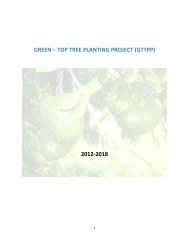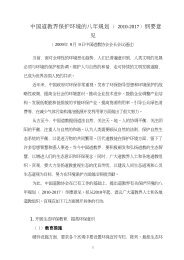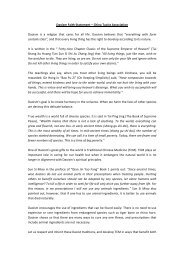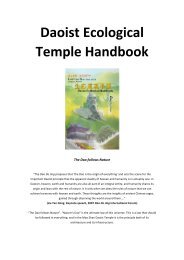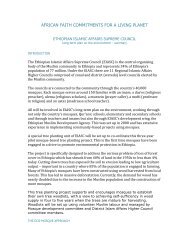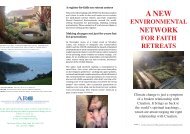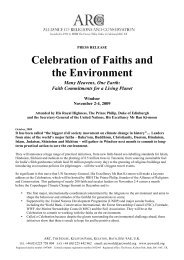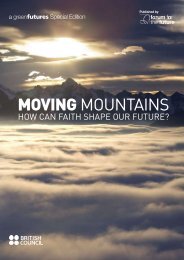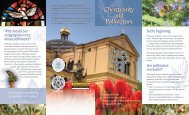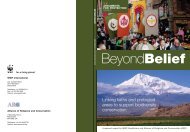summary paper - Alliance of Religions and Conservation
summary paper - Alliance of Religions and Conservation
summary paper - Alliance of Religions and Conservation
Create successful ePaper yourself
Turn your PDF publications into a flip-book with our unique Google optimized e-Paper software.
* Sikhs feed more than 30 million people a day from their Gurdwara kitchens. They have in the past<br />
applied for grants from donors to help them switch to other power sources, <strong>and</strong> make the Gurdwaras<br />
more environmentally friendly. So far the donors have all said they do not work with religions.<br />
* The Church <strong>of</strong> Sweden, ARC <strong>and</strong> Jinja Honjo (Shintos) have started plans to set up what would<br />
effectively be a religious FSC certification system – useful for all those faiths who either own forests or<br />
who consume forest products (i.e. all <strong>of</strong> them). When the Ise Shrine is rebuilt in 2013 it is planned that all<br />
major religious forest owners will have been presented with, <strong>and</strong> hopefully signed up to, this Religious<br />
forestry certification scheme. Again it has been hard to get donor governments interested.<br />
* In urban areas many faiths are deeply involved in helping alleviate poverty. Indeed in many countries<br />
the poorest people tend to organise themselves through their religious organisations. For example the<br />
Kimbanguist church in Congo has eight million members. They operate a non cash based economy which<br />
has meant they have survived the chaos <strong>of</strong> the past few years.<br />
From this meeting it is now clear that the huge scale <strong>of</strong> work that the faiths have already been<br />
undertaking in these areas has to become part <strong>of</strong> the equation <strong>of</strong> the international work for sustainable<br />
development <strong>and</strong> respect for creation. And this can be done only through real <strong>and</strong> meaningful<br />
relationships where all the parties respect each other’s identity <strong>and</strong> specific contribution.<br />
During the meeting we have identified a need for secular groups <strong>and</strong> religious groups to work together on<br />
development <strong>and</strong> environmental issues as partners. And there are plenty <strong>of</strong> potential partnerships. It has<br />
been suggested that ARC should be the broker in these partnerships – that now it is time for the<br />
invitations to be extended. We thank you for your trust <strong>and</strong> I highlight that ARC is very happy to facilitate<br />
this relationship <strong>and</strong> that we are ready to do so. But as with any dating agency we need to charge a fee.<br />
We are a small group <strong>and</strong> we are entirely reliant on donations from secular organisations.<br />
In the early 1990s, I went to visit Patriarch Alexei in Russia. Most people think that the years under<br />
communism were the greatest trials for the Church. But they were not, he said. The danger today is that<br />
the expectations for the Church are now so great that we won’t be able to meet them <strong>and</strong> then they will<br />
turn against us.<br />
In 1986 WWF invited leaders <strong>and</strong> thinkers from five religions to come to Assisi. First WWF told them<br />
about the scale <strong>of</strong> the ecological crisis, <strong>and</strong> this was news to most <strong>of</strong> them. WWF was sure that the<br />
religious groups would be interested in what they were saying <strong>and</strong> they would deliver WWF’s vision. Then<br />
the religions asked them what WWF <strong>and</strong> others were doing about justice <strong>and</strong> poverty. And it was news to<br />
the environmentalists that they couldn’t think about addressing the issue <strong>of</strong> the environment without<br />
addressing social justice. Now it has become part <strong>of</strong> the way people think, but not then. Therefore it is<br />
true that religions have a great deal to learn from the secular world but the secular world has to learn a<br />
great deal from the religions too.<br />
Gerd Pettersen<br />
Asst. Director General, Section for International Development Policy, Norwegian Ministry <strong>of</strong><br />
Foreign Affairs<br />
Main points:<br />
· From the Norwegian Ministry <strong>of</strong> Foreign Affairs’ point <strong>of</strong> view, we have had two main reasons<br />
for deciding to host this conference: Firstly, we feel it is important to shed light on the<br />
relationship – <strong>and</strong> in many cases the unfortunate lack <strong>of</strong> relationship <strong>and</strong> dialogue – between<br />
the donor community <strong>and</strong> the religions. Secondly, environment <strong>and</strong> climate issues are one <strong>of</strong><br />
the Government’s five main “pillars” in the area <strong>of</strong> development cooperation. This area will<br />
also enjoy a considerable budget increase next year, out <strong>of</strong> a total development aid budget<br />
that will for the first time top 20 billion NOK in 2007.<br />
· Another pillar is that <strong>of</strong> gender <strong>and</strong> equal rights for women. This is an issue that has been<br />
raised in various contexts during this conference, <strong>and</strong> I would simply like to underline once<br />
59



